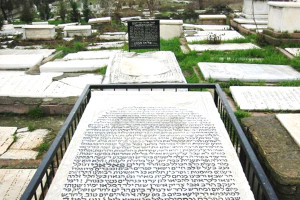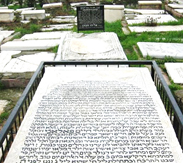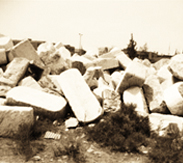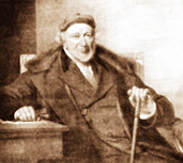 Print this Article
Print this Article

Ribbi Hayim Palachi זצ”ל – or as he is affectionately referred to as “מרן החבי”ף” – was one of the most well-known and prolific Torah giants of the 19th century. Ribbi Hayim as born in 1788 in Izmir (Smyrna) – a thriving city with a prominent and scholarly Jewish community in the Ottoman Empire – into a family of respected Hachamim. His father, Ribbi Yaakov Palachi זצ”ל, was the head of Yeshivat Bet Yaakov Rabi, and his maternal grandfather, who taught him much of his Torah during his early years, was Ribbi Refael Yosef Hazan זצ”ל, the Rishon L’Tziyon and author of the monumental work Hikre Lev.
Studying under his legendary grandfather, as well as Hacham Yitzhak Gatenyo (author of Bet Yitzhak) and Hacham Yitzhak Navaro (author of Lev Mevin), the young Ribbi Hayim did not waste any time, as he writes in one of his sefarim: “I can attest that until reaching twenty years of age, I did not disrupt my study for even one moment.” Ribbi Hayim got married at 20 years old and continued studying Torah diligently, earning the rare title of HaHacham HaShalem – the complete Hacham – from his grandfather at the young age of 29.
Despite his reputable scholarship, Ribbi Hayim refused to accept any public rabbinic position during his father’s lifetime. After Ribbi Yaakov’s passing, Ribbi Hayim joined the Bet Din of Izmir, ascending to the position of Av Bet Din ten years later and ultimately becoming the Hacham Bashi – the chief rabbi of the Ottoman Empire – a positon backed by the Ottoman Sultan, granting Ribbi Hayim tremendous executive authority.
Ribbi Hayim used his authority to institute laws and taxes to protect and support the widows and orphans of Izmir. Ribbi Hayim established a “mandatory education law” which did not allow parents to pull their children out of school before they were well versed in basic reading and Tefillot, and forbidding the employment of children who were considered by especially assigned supervisors to require more schooling. With the help of renowned philanthropists Sir Moses Montefiore and Baron Binyamin Rothschild, Ribbi Hayim also established a hospital in the city.
Perhaps the most powerful example of Ribbi Hayim’s influence and dedication to the Jewish community was the infamous “Damascus Affair”, a medieval-style blood libel which threatened to destroy the Jewish community in Damascus and the surrounding region in the year 1840. Upon the disappearance of a Christian monk and his Muslim assistant, allegations were made that the Jews were behind their murder for the purpose of “ritual matzah baking”. The French were all-too eager to believe in these baseless accusations and a full-fledged pogrom unfolded. Community leaders and Hachamim endured unspeakable torture, the Jewish dead were dug out of their graves and many were brutally killed.
Hacham Yaakov Antebi זצ”ל, the chief rabbi of Damascus – who endured harsh torture as well – sent urgent requests for help to his uncle in Aleppo, Hacham Avraham Antebi זצ”ל, and the international Jewish community sprung into feverish efforts to diffuse the situation. Ribbi Hayim Palachi’s enormous influence was instrumental in mobilizing Sir Moses Montefiore and Sir Baron Rothschild, who, along with Jewish-French lawyer Adolphe Crémieux and diplomat Eliyahu Piccioto, were able to apply the appropriate pressure at the highest levels of government to finally bring this gruesome saga to an end.
Carrying the weight of his generation did not slow Ribbi Hayim’s Torah study and scholarship not one bit. Ribbi Hayim authored some 80 sefarim in all areas of Torah: Halacha, Talmud, Darush etc. as well as answered questions of Hachamim from all corners of the earth, ranging from the Malbim and Maharam Padua of Brisk to Hacham Menashe Sitehon of Aleppo and the Ben Ish Hai of Baghdad. His sefarim are still some of the most quoted in Torah literature today, and his mention is always accompanied by a sense of reverence, as well as affection, for the clarity and brilliance of his writings. He was once asked how he can write so much Torah, despite his impossibly tight schedule and responsibilities. “I write between appointments”, he answered, humbly brushing aside his genius and diligence.
In the year 1867, Ribbi Hayim was called up to the Torah as Hatan–Torah, and as he read the verse: “and Moshe, servant of Hashem, passed away…” he burst into tears, upon which his devastated community realized that they would lose him that year. When he fell ill, he sensitively asked that the poor should be hired to pray for him instead of troubling the entire community with Tefilla gatherings for his well-being. That year on the 17th of Shevat, Maran HaHabif – the pride of his generation – passed away and was accompanied to his final resting place by the entire community as well as a special honor guard of the Ottoman Empire. He was survived by his sons Ribbi Avraham, Ribbi Rahamim Nissim Yitzhak and Ribbi Yosef, all of whom were distinguished Torah scholars and authors. Through his sefarim – most of which include the word “Hayim” in the title – Ribbi Hayim’s Torah lives on and continues to guide the Torah scholars of our generation.
Pullout Quote:
[Ribbi Hayim’s] sefarim are still some of the most quoted in Torah literature today, and his mention is always accompanied by a sense of reverence, as well as affection, for the clarity and brilliance of his writings.


